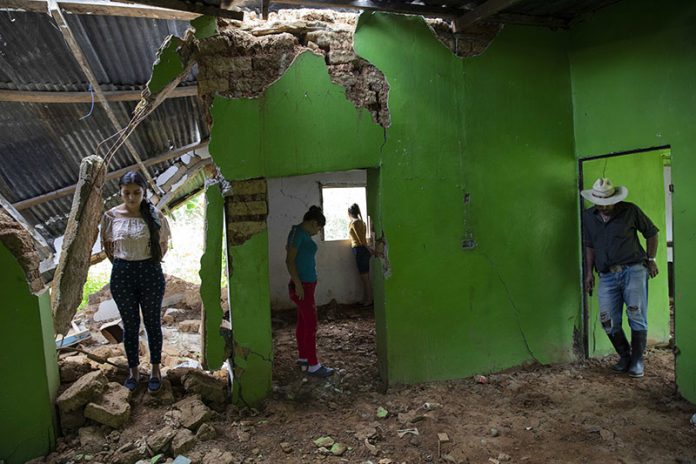
By RODRIGO ABD and ALBERTO ARCE
Associated Press
EL ENCANTO, Honduras (AP) — Dr. Claudia Lazo is asked: How many of your patients are depressed? “All of them,” she answers. “All of them. All of them. All of them. All of them. All of them.”
The patients at her modest rural health center suffer from solastalgia — sadness and pain provoked by the loss of their environment. They’ve lost their physical homes and their psychological well-being.
On the night of Nov. 24, 2020, their town — La Reina — was wiped from the face of the earth.
___
This story is part of a series, After the Deluge, produced with support from the Pulitzer Center on Crisis Reporting.
___
Home to about 1,000 people, the town in western Honduras was hit by two powerful hurricanes within three weeks, natural disasters made far worse by local deforestation and climate change. La Reina was buried by a landslide.
No one died. But seven months later, La Reina’s people remain homeless, and adrift. They are alive, but their place in the world is gone — the place where they lived, loved, dreamed, had children, grew coffee, corn and beans.
Here, they had invested their savings and money sent home from relatives in the United States, transforming a mountainside into a town of 300 homes. Nature has taken it all back.
Olga Ondina, 52, suffers from insomnia, unable to sleep in an unfamiliar house. “I wake up at midnight and try to go to my old bathroom, but it isn’t there anymore,” she says.
She gathers red flowers from the site of the home where she raised her five children, to be displayed in the homes of relatives who have taken her family in. “I realize I’m not at home, and I cry. My parents lived and died here, my children were born here. Today I came to cry.”
Over the decades, Julio Villanueva Melgar, 70, raised a family and made a living in La Reina. Villanueva feels as if he’s been hurled into a new and more hostile universe.
“One becomes crazy, disoriented,” Villanueva says. “You don’t fit in anymore.”
Orlando Perdomo, muscular from working the land for much of his 56 years, sits and spends the afternoon with a group of friends alongside a lake born of the same rainfall and landslide that devoured his hometown.
“When the first cracks in the earth opened after Hurricane Mitch (in 1998), my father said the he wouldn’t live to see it, but that we would see the town disappear, that the future would bring death,” Perdomo recalls.
Lazo has treated nearly all of La Reina’s people, and he’s seen a lot of tears.
“They sit in front of me and I ask them, ‘How are you?’ They start to cry.”
Their own actions are partly the cause of their predicament. For decades, the people of La Reina cut cedar and cinnamon trees from the highest slopes of surrounding mountains to expand their coffee plantations and get timber to build their homes.
The severed roots rotted, and no longer fixed the soil on the hillside. Pelted by days of intense rain from hurricanes Eta and Iota, the earth rose up and devoured La Reina within hours, burying its remains beneath tons of slick, slippery mud.
Lazo cautions against blaming the victims. “They didn’t deforest the countryside because they wanted to, but because of poverty,” he says. “They needed to warm themselves, to build, and the country gave them no option other than cutting down the forest.”
Now, Lazo tries to piece these broken people together again. “Medicine can help some sleepless nights, but it doesn’t cure collective depression in a country with a humble, rural population without psychological or psychiatric services,” he says.
“How do you cure what cannot be cured?” the doctor asks.



















